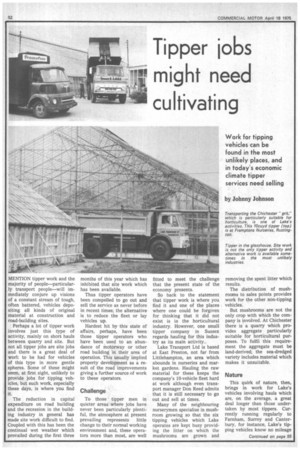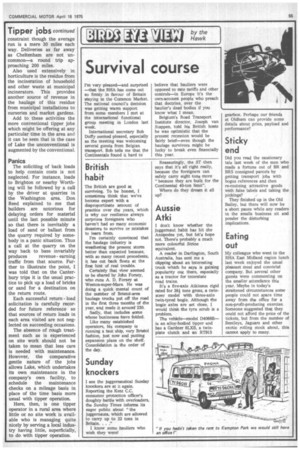Tipper jobs IR might need cultivating
Page 54

Page 57

If you've noticed an error in this article please click here to report it so we can fix it.
Work for tipping vehicles can be found in the most unlikely places, and in today's economic climate tipper services need selling by Johnny Johnson
MENTION tipper work and the majority of people—particular. Iy transport people—will immediately conjure up visions of a constant stream of tough, often battered, vehicles depositing all kinds of original material at construction and road-building sites.
Perhaps a lot of tipper work involves just this type of activity, mainly on shorthauls between quarry and site. But not all tipper jobs are site jobs and there is a great deal of work to be had for vehicles of this type in more gentle spheres. Some of these might seem, at first sight, unlikely to provide jobs for tipping vehicles, but such work, especially these days, is where you find it.
The reduction in capital expenditure on road building and the recession in the building industry in general has made site work difficult to find. Coupled with this has been the continual wet weather which prevailed during the first three months of this year which has inhibited that site work which has been available.
Thus tipper operators have been compelled to go out and sell the service as never before in recent times; the alternative is to reduce the fleet or lay vehicles up.
Hardest hit by this state of affairs, perhaps, have been those tipper operators who have been , used to an abundance of motorway or other road building in their area of operation. This usually implied property development as a result of the road improvements giving a further source of work to these operators.
Challenge
To those •• tipper men in quieter areas where jobs have never been particularly plentiful, the atmosphere at present prevailing represents little change to their normal working environment and, these operators more than most, are well fitted to meet the challenge that the present state of the economy presents.
So back to the statement that tipper work is where you find it and one of the places where one could be forgiven for thinking that it did not exist is in the horticultural industry. However, one small tipper company in Sussex regards hauling for this industry as its main activity., Lake Transport Ltd is based at East Preston, not far from Littlehampton, an area which abounds in nurseries and market gardens. Hauling the raw material for these keeps the company's 10-vehicle fleet hard at work although even transport manager Don Reed admits that it is still necessary to go out and sell at times.
Many of the neighbouring nurserymen specialise in mushroom growing so that the six tipping vehicles which Lake operates are kept busy providing the litter on which the mushrooms are grown and removing the spent litter which results.
The distribution of mushrooms to sales points provides work for the other non-tipping vehicles.
But mushrooms are not the only crop with which the company is involved. At Chichester there is a quarry which provides aggregate particularly suitable for horticultural purposes. To fulfil this requirement the aggregate must be land-derived; the sea-dredged variety includes material which makes it unsuitable.
Nature
This quirk of nature, then, brings in work for Lake's vehicles involving hauls which are, on the average, a great deal longer than those undertaken by most tippers. Currently running regularly to Farnham, Surrey and Canterbury, for instance, Lake's tipping vehicles know no mileage constraint though the average run is a mere 30 miles each way. Deliveries as far away as Cheltenham are not uncommon—a round trip approaching 200 miles.
Also used extensively in horticulture is the residue from the incineration of household and other waste at municipal incinerators. This provides another source of revenue in the haulage of this residue from municipal installations to nurseries and market gardens.
Add to these activities the more conventional tipper jobs which might be offering at any particular time in the area and it can be seen that in the case of Lake the unconventional is augmented by the conventional.
Panics
The soliciting of back loads to help contain costs is not neglected. For instance, loads to Brighton or nearby Worthing will be followed by a call by the driver at quarries in the Washington area. Don Reed explained to me that builders are notorious for delaying orders for material until the last possible minute so that there is inevitably a load of sand or ballast from the quarry required by somebody in a panic situation. Thus a call at the quarry on the way back to base invariably produces revenueearning traffic from that source. Further to illustrate the point, I was told that on the Canterbury trips it is the usual practice to pick up a load of bricks or sand for a destination on the return route.
Each successful return load solicitation is carefully recorded for future reference so that sources of return loads in each area visited are not neglected on succeeding occasions.
The absence of rough treatment such as is experienced on site work should not be taken to mean that less care is needed with maintenance. However, the comparative gentle nature of the jobs allows Lake, which undertakes its own maintenance in the company's own facility, to schedule the maintenance checks on a mileage basis in place of the time basis more usual with tipper operation.
Here, then, is one tipper operator in a rural area where little or no site work is available who is managing quite nicely by serving a local industry having little, superficially, to do with tipper operation.








































































































































